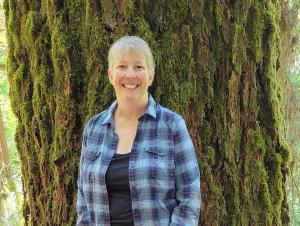Ph.D. SUNY College of Environmental Science and Forestry, Syracuse, NY
M.S. Oregon State University, Corvallis, OR
B.S. SUNY College of Environmental Science and Forestry, Syracuse, NY
I am a forest ecologist who uses an interdisciplinary framework to study large landscapes. My research is innovative (e.g. using virtual reality to envision how forests will look under climate change), translational (often stakeholder-driven by federal agencies) and involves working with indigenous communities (Menominee in WI). My current research focuses on wildfires and climate change in the boreal forests of Alaska; wildfire, insects and management in the boreal forests and tundra of Siberia; hurricanes and forest management in southeastern AK; and forest management in the Pacific Northwest.
Recent Publications (in the last five years)
Gustafson, EJ, MS Lucash, AZ Shvidenko, BR Sturtevant, BR Miranda, D Schepaschenko, H Matsumoto. 2024. Climate change and disturbance interact to alter landscape reflectivity (albedo) in boreal forests across a large latitudinal gradient in Siberia. Science of the Total Environment 956 https://doi.org/10.1016/j.scitotenv.2024.177043
Deak, AK, MS Lucash, MR Coughlan, S Weiss, LCR Silva. 2024. Prescribed fire placement matters more than increasing frequency and extent in a simulated Pacific Northwest landscape. Ecosphere 15 (4), e4827. https://doi.org/10.1002/ecs2.4827
Lucash MS, NG Williams, V Srikrishnan, K Keller, RM Scheller, C Hegelson, RE Nicholas and EAH Smithwick. 2023. Balancing multiple forest management objectives under climate change in central Wisconsin, U.S.A. Trees, Forests and People 14: 100460. https://doi.org/10.1016/j.tfp.2023.100460
Weiss, SA, AM Marshall, KR Hayes, DM Nicolsky, B Buma and MS Lucash. 2023. Future transitions from a conifer to a deciduous-dominated landscape are accelerated by greater wildfire activity and climate change in interior Alaska. Landsc Ecol 38, 2569–2589 (2023). https://doi.org/10.1007/s10980-023-01733-8
Nasr-Azadani, E, EAH Smithwick, SJ Steidle, MS Lucash, DH Wardrop, NT Fregien, and TR Kenote. 2023. Integrating Menominee model for sustainable forestry with Systems Thinking competency through 3D virtual tours. https://link.springer.com/article/10.1007/s11625-023-01399-w
Williams, NG, MS Lucash, MR Ouellette, T Brussel, EJ Gustafson, SA Weiss, BR Sturtevant, DG Schepaschenko and AZ Shvidenko. 2023. Simulating dynamic fire regime and vegetation change in a warming Siberia. Fire Ecology 19 (1), 1-29. https://fireecology.springeropen.com/articles/10.1186/s42408-023-00188-1
Lucash, MS, AM Marshall, SA Weiss, JW McNabb, DJ Nicolsky, G Flerchinger, TE Link, JG Vogel, RM Scheller, RZ Abramoff, and VE Romanovsky. 2023. Burning trees in frozen soil: Simulating fire, vegetation, soil, and hydrology in the boreal forests of Alaska. Ecological Modelling 481, 110367. https://www.sciencedirect.com/science/article/abs/pii/S0304380023000959
Steidle, S, MS Lucash, E Nasr-Azadani, and E Smithwick. 2023. Testing presence, assessing attitudes: Study of a 3D virtual tour in an “aesthetically challenged” landscape. Journal of Environmental Management 337, 117574. https://www.sciencedirect.com/science/article/abs/pii/S0301479723003626
Lucash M, S Weiss, MJ Duveneck and RM Scheller. 2022. Managing for red-cockaded woodpeckers is more complicated under climate change. Journal of Wildlife Management 86:e22309. https://doi.org/10.1002/jwmg.22309
Shuman, JK, JK Balch, RT Barnes, PE Higuera, CI Roos, DW Schwilk, E Stavros, T Banerjee, MM Bela, J Bendix, S Bertolino, S Bililign, KD Bladon, P Brando, RE Breidenthal, B Buma, D Calhoun, LMV Carvalho, ME Cattau, KM Cawley, SChandra, ML Chipman, J Cobian-Iñiguez, E Conlisk, JD Coop, A Cullen, KT Davis, A Dayalu, F De Sales, M Dolman, LM Ellsworth, S Franklin, CH Guiterman, M Hamilton, EJ Hanan, WD Hansen, S Hantson, BJ Harvey, A Holz, T Huang, MD Hurteau, NT Ilangakoon, M Jennings, C Jones, A Klimaszewski-Patterson, LN Kobziar, J Kominoski, B Kosovic, MA Krawchuk, P Laris, J Leonard, S Marcela Loria-Salazar, M Lucash, H Mahmoud, E Margolis, T Maxwell, JL McCarty, DB McWethy, RS Meyer, JR Miesel, W Keith Moser, R Chelsea Nagy, D Niyogi, H M Palmer, A Pellegrini, B Poulter, K Robertson, AV Rocha, M Sadegh, F Santos, F Scordo, JO Sexton, AS Sharma, A.M.S Smith, AJ Soja, C Still, T Swetnam, AD Syphard, MW Tingley, A Tohidi, AT Trugman, M Turetsky, J M Varner, Y Wang, T Whitman, S Yelenik, X Zhang 2022. Reimagine fire for the anthropocene. PNAS Nexus, 1(3), 115. https://doi.org/10.1093/pnasnexus/pgac115
Shabaga, JA, R Bracho, PA Klockow, MS Lucash and JG Vogel 2022. Shortened fire intervals stimulate carbon losses from heterotrophic respiration and reduce understorey plant productivity in boreal forests. Ecosystems. https://doi.org/10.1007/s10021-022-00761-w
Huang, J, MS Lucash, RM Scheller, and A Klippel. 2020. Walking through the forests of the future: using data-driven virtual reality to visualize forests under climate change. International Journal of Geographical Information Science 35:6, 1155-1178. doi/10.1080/13658816.2020.1830997
Schrum, P, RM Scheller, MJ Duveneck, and MS Lucash. 2020. Base-Hurricane: A new extension for the Landis-II forest landscape model. Environmental Modelling & Software 133: 104833. doi.org/10.1016/j.envsoft.2020.104833
Buma B, SA Weiss, K Hayes and MS Lucash. 2020. Wildland fire reburning trends across the US West suggest only short-term negative feedback and differing climatic effects. Environmental Research Letters 15(3): 034026. doi.org/10.1088/1748-9326/ab6c70
Buma, B, K Hayes, S Weiss and M Lucash. 2022. Short-interval fires increasing in the Alaskan boreal forest as fire self-regulation decays across forest types. Scientific Reports 12: 4901. https://doi.org/10.1038/s41598-022-08912-8

